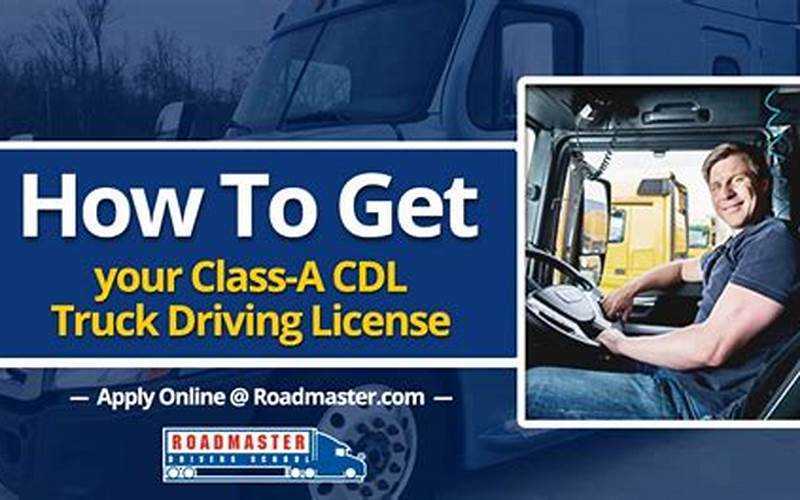
Source: bing.com
Hello, Vehicle Owner! Are you interested in obtaining a Commercial Driver’s License (CDL) to enhance your career prospects in the transportation industry? Look no further, as this article will provide you with a step-by-step guide on how to get a CDL. Whether you aspire to become a truck driver, bus driver, or any other commercial vehicle operator, this informative piece will equip you with the necessary knowledge and requirements to embark on this exciting journey.
Introduction
Before delving into the details, let’s understand the significance of a CDL. A CDL is a specialized license that allows individuals to operate commercial vehicles weighing over 26,000 pounds or carrying more than 16 passengers. It is a vital document for those seeking employment in the transportation industry, as it demonstrates their competency in handling larger vehicles.
Acquiring a CDL involves a combination of written tests, skills assessments, and practical driving experiences. It is important to note that the specific requirements and procedures may vary slightly from state to state. Therefore, it is essential to familiarize yourself with your state’s Department of Motor Vehicles (DMV) guidelines and regulations.
Now, let’s explore the strengths and weaknesses of the process of obtaining a CDL.
Strengths of Getting a CDL







Weaknesses of Getting a CDL







How to Get a CDL: Step-by-Step Guide
| Step | Description |
|---|---|
| 1 | Research CDL Requirements in Your State |
| 2 | Obtain a Commercial Learner’s Permit (CLP) |
| 3 | Enroll in a CDL Training Program |
| 4 | Study for the Written Knowledge Test |
| 5 | Pass the Written Knowledge Test |
| 6 | Undergo Skills Training and Practice |
| 7 | Take the CDL Skills Test |
| 8 | Apply for a CDL at Your Local DMV |
| 9 | Complete any Additional Endorsements or Certifications |
| 10 | Start Your CDL Career Journey |
Frequently Asked Questions (FAQs)
1. What is the minimum age requirement to obtain a CDL?
Answer: The minimum age requirement varies by state and the type of CDL you intend to obtain. In most states, the minimum age is 18 for intrastate (within the state) CDLs and 21 for interstate (across state lines) CDLs.
2. Can I apply for a CDL if I have a history of traffic violations?
Answer: While a history of traffic violations may not disqualify you from obtaining a CDL, it can affect your eligibility. Each state has its own regulations regarding the severity and recency of violations. It is best to check with your local DMV for specific guidelines.
3. Do I need a special medical certification to get a CDL?
Answer: Yes, you need to pass a Department of Transportation (DOT) medical examination to obtain a CDL. This examination ensures that you are physically fit to operate commercial vehicles safely.
4. Are there any study materials available for the CDL written knowledge test?
Answer: Yes, there are numerous study materials available, including official CDL manuals provided by state DMVs, online practice tests, and commercial study guides. These resources can help you prepare for the written knowledge test.
5. Can I obtain a CDL without attending a training program?
Answer: While it is possible to obtain a CDL without attending a training program, it is highly recommended to enroll in a reputable CDL training program. These programs provide essential knowledge, hands-on skills training, and increase your chances of passing the CDL exams.
6. How long does it take to get a CDL?
Answer: The time required to obtain a CDL varies depending on individual circumstances, including the type of CDL, training program duration, and personal dedication. On average, the process can take anywhere from a few weeks to several months.
7. Can I upgrade my existing driver’s license to a CDL?
Answer: Yes, if you already possess a valid driver’s license, you can upgrade it to a CDL by fulfilling the specific requirements, such as passing the written and skills tests.
Conclusion
In conclusion, obtaining a CDL can be a rewarding and fulfilling endeavor for vehicle owners aiming to pursue a career in the transportation industry. While the process may have its challenges and drawbacks, the benefits, opportunities, and job stability make it a worthwhile pursuit. By following the step-by-step guide and understanding the requirements outlined in this article, you can embark on your journey to becoming a licensed commercial vehicle operator. Take the first step today and unlock a world of possibilities as a CDL holder!
Disclaimer: The information provided in this article is for general guidance purposes only. It is essential to consult your local DMV and follow the specific guidelines and regulations of your state.
 MyVans Your Vehicle Solution
MyVans Your Vehicle Solution